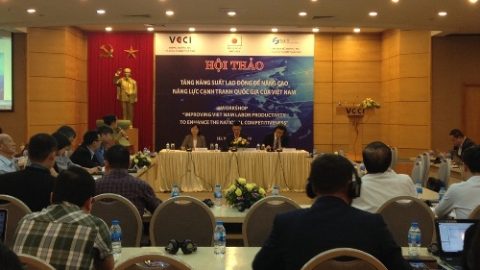
Overview of the Conference "Increasing labor productivity to enhance Vietnam's national competitiveness"
The core central element of national competitiveness as well as creating sustainable prosperity is labor productivity. Therefore, to improve the competitiveness of the economy, Vietnam needs to increase the national labor productivity.
This is emphasized by Mr. Vu Tien Loc – Chairman of Vietnam Chamber of Commerce and Industry (VCCI) at the seminar “Increasing labor productivity to enhance Vietnam’s national competitiveness”, organized by VCCI in collaboration with a number of organizer organized the afternoon on March 21.
Labor productivity is still very low
Mr. Vu Tien Loc said that Vietnam has maintained the growth rate of labor productivity in recent years and is a country with high growth rate of labor productivity in ASEAN. Specifically, in the period of 10 years from 2008 to 2017, labor productivity by purchasing power parity in 2011 (PPP 2011) of Vietnam increased an average of 4%/year, higher than the average increase of Singapore (0.9 %/year), Malaysia (1.1%/year), Thailand (2.6%/year), Philippines (3.3 %/year), Indonesia (3.4%/year).
However, according to Mr. Loc, although Vietnam has maintained a relatively high growth rate of labor productivity, Vietnam’s labor productivity is still very low when compared with the average labor productivity of some countries in the region.
Specifically, according to PPP 2011, Vietnam’s labor productivity in 2017 reached 10,232$, equal to 7.2% of Singapore’s labor productivity, 18.4% of Malaysia, 36.2% of Thailand, 43% of Indonesia and equal to 55% of the Philippines. “More worrying is the disparity in the level of labor productivity between Vietnam and other countries continues to increase, showing the gap and challenges faced by the Vietnamese economy in order to catch up with Water is very large ”- Mr. Loc stressed.
It is necessary to accelerate the policy implementation process
Sharing the same view with VCCI representative, Mr. Kenichi Ohno – Japan National Policy Research Institute said that many countries have built and successfully implemented typical national productivity movements such as Singapore, Korea, and Japan. The experiences of the above countries show that, in order for Vietnam to successfully build a national productivity movement, it is necessary to converge elements from the commitments of the Party and Government leaders to raise national awareness and There are effective enforcement measures.
Specifically, first of all, the leaders of the Party and the Government must have clear commitments, need to strongly support the implementation of policies as well as participate in the policy implementation process. Party and Government leaders need to ensure that any problems that arise arise will be solved and policies will be implemented effectively and bring good results.
At the same time, national awareness campaigns on productivity need to be organized. All objects in society from ministers, officials, business leaders to workers, farmers and students, etc need to recognize the special importance of labor productivity for each business and the country.